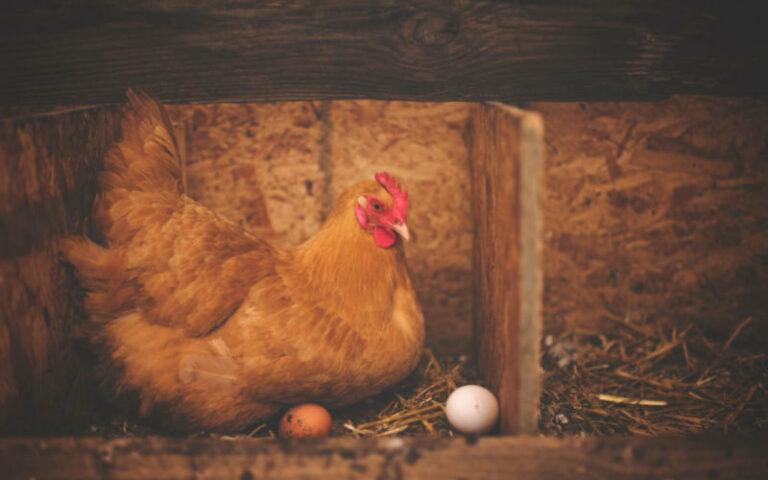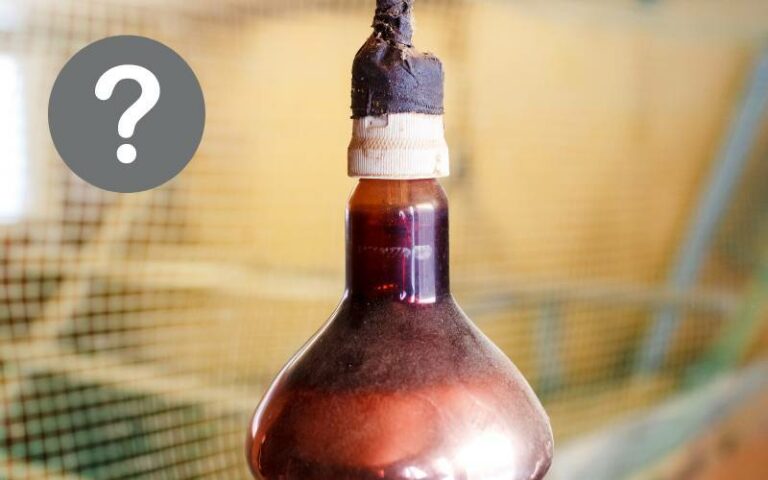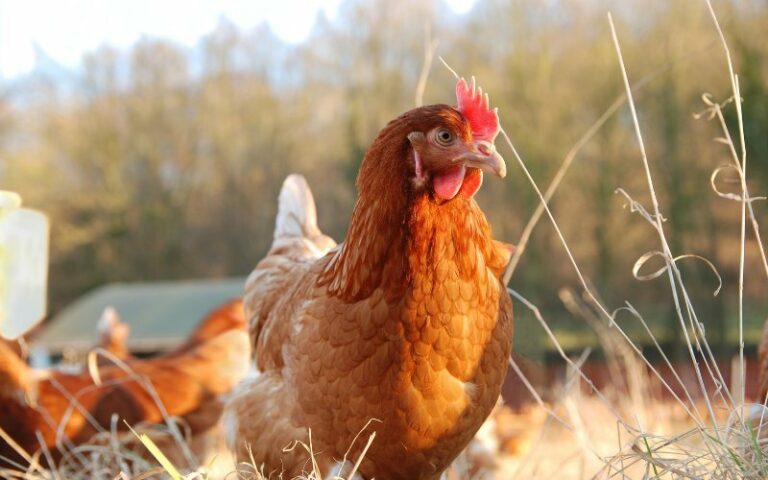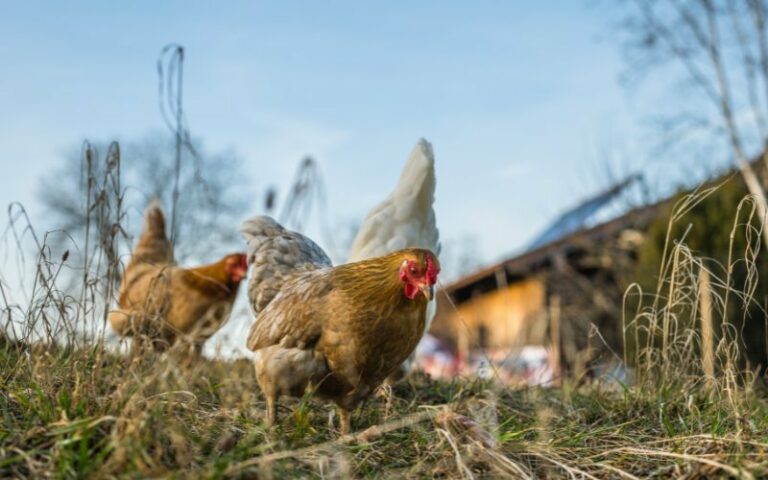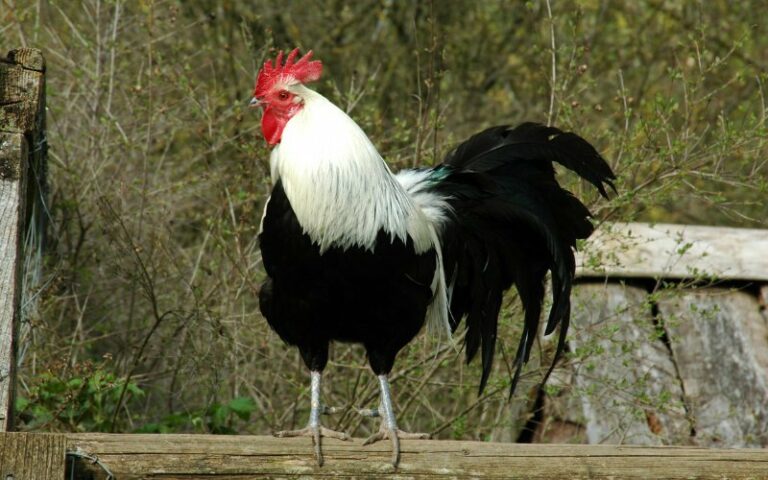Do Mosquitoes Bite Chickens? (+ My Advice)
If you live in an area that has a lot of mosquitoes, you’re well-acquainted with how annoying they are. Mosquitoes are, in my opinion, the worst insects of all time – and I also happen to believe that strong bug repellent and mosquito netting might be some of the best inventions ever made.
Mosquitoes can ruin a peaceful evening on the patio or porch, but the good thing is that we can always go inside when the mosquitoes get bad. Some animals, however, aren’t so lucky. If you live in an area that has a lot of mosquitoes, you might be understandably concerned for your backyard chickens.
Though chickens can actually help keep the mosquito population down, they’re still susceptible to mosquito bites. I’ve found that, while chickens don’t seem to attract mosquitoes the way I do, if chickens and mosquitoes are in the same area, chickens will get bitten.
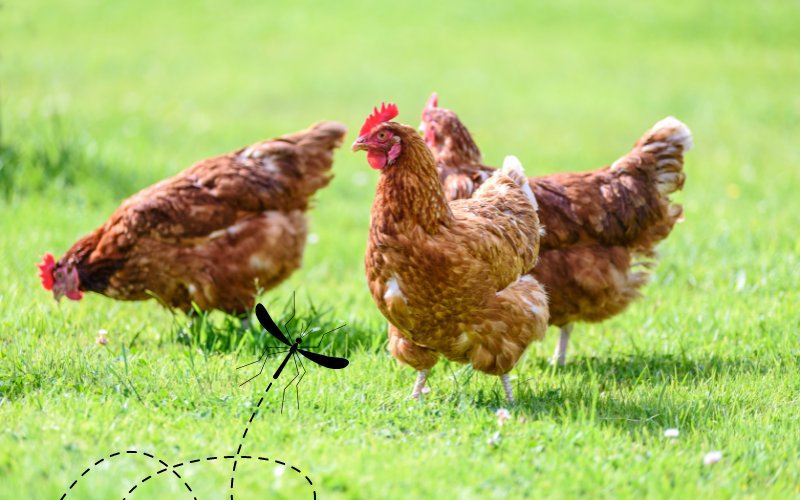
Do Mosquitoes Bite Chickens (The Short Answer)
Yes. Mosquitoes will often bite chickens, and they can carry and spread diseases like chicken malaria, West Nile virus, and fowlpox. While mosquito bites and the diseases that result rarely kill chickens, they can cause extreme discomfort among your flock. If you notice signs of sickness or irritation, you should both treat the bites and try to prevent them in the future.
How to Treat Mosquito Bites on Chickens (2 Ideas)
Chickens are protected by a thick layer of feathers that mosquitoes often have trouble penetrating. But, despite that, mosquitoes do bother chickens and can bite them, especially on their unprotected combs and wattles.
Let Them Recover
In most cases, mosquitoes in the chicken coop won’t permanently harm your flock. Mosquito bites are simply irritating to chickens and will go away on their own. Additionally, because chickens are covered with a thick layer of feathers, they have some natural protection against mosquitoes.
So, in most cases, you don’t need to do anything for chickens that have already been bitten. If you want to help your chickens, mosquito control will be more effective.
Treat Them For Diseases Spread by Mosquitoes
If your chickens are showing symptoms beyond minor irritation and your mosquito problem is particularly bad, they could have one of the diseases spread by mosquitoes.
Treat them as you would any sick chicken; keep them hydrated and comfortable and try to wait the illness out. If they’re not getting better and your chickens matter enough to you, have a vet test and treat them.
You don’t have to worry about chickens spreading disease among themselves. Most of the diseases that are spread by mosquitoes are only spread by mosquitoes – so an infected chicken won’t be contagious to the other chickens.
Protecting Chickens From Mosquitoes (4 Things to Try)
While chickens don’t attract mosquitoes, these insects can still irritate your flock. Here are some tips to get rid of mosquitoes in your chicken coop.
Get Rid of Standing Water
If you want to eliminate a problem, you should stop it where it starts – and for mosquitoes, that’s in standing water. Water may gather in these places:
- Gutters: You might not notice that your gutters are full of standing water. Leaves and other debris might block the gutter or soak up water, creating the perfect environment for mosquito larvae.
- Pots, buckets, and other trash: If you have a lot of junk or unused containers lying around, chances are some of it is holding water. An old wheelbarrow filled with rainwater might be generating a lot of mosquitoes, for example. Try to get rid of items like these by throwing them out, covering them with a waterproof tarp, or moving them inside a barn or garage.
- Chicken waters: Your mosquito problem might be originating in your chicken waters. Of course, these containers need to hold standing water for the chickens to drink – but you might want to consider other types of chicken waters that make it more difficult for mosquitoes to access the water. If that’s not an option, make sure that you’re changing the water and cleaning the container at least once every two days. Because it takes mosquito larvae eight to ten days to hatch, changing your chicken water more often makes it more difficult for the larvae to survive.
- Ponds: Ponds, especially those that are small and shallow, can cause an increased mosquito population. Purchase fish that feed on mosquito larvae and get plants that deter them, like water lilies.
- Puddles and swamps: Puddles have been an ongoing problem for me – every time it rains, the water stays around for weeks. If you have a lot of puddles or swamps, especially around or inside your chicken coop, find a way to drain them or use soil or gravel to soak the water up.
Attract Mosquito Predators
Contrary to popular belief and my childhood conviction, mosquitoes do have a purpose – they’re prey for many animals. Take advantage of that when you’re trying to get rid of mosquitoes.
If you encourage mosquito predators to hang out on your land, they’ll take advantage of the food source available to them – the mosquitoes – and you’ll find that the mosquito population will substantially decrease.
I’ve compiled a list of the best mosquito predators to attract to your land.
- Bats: A single bat will eat up to 1000 mosquitoes in a night. Attract bats with a bat house attached to a chicken coop or a tree.
- Birds: Birds also eat a lot of mosquitoes. Use birdhouses, birdbaths, and bird feeders to encourage these feathered friends to stick around and feast on mosquitoes.
- Fish: They need water to survive, so it’s impractical to install a mosquito-attracting pond just so that your mosquito-eating fish can stay alive. However, if you already have a pond, definitely consider keeping fish in it that prey on mosquito larvae.
- Frogs and toads: Frogs and toads are attracted to water, so if you have a pond, you probably have some hanging around and eating mosquitoes.
- Dragonflies: These insects are also attracted to water and will eat mosquitoes. Having varied vegetation helps attract dragonflies as well.
Use Natural Bug Sprays, Essential Oils, and Herbs
There are many chemical bug sprays on the market, and while they are very effective, they can disturb the ecosystem, affect your chickens, and cause mosquitoes to develop immunity to the chemicals.
I prefer to use natural alternatives, which can be just as effective. You can create bug sprays from essential oils or simply plant-repellent plants near your coop. Some of the most effective mosquito repellents are:
- Citronella and lemongrass: Essential oils from these herbs can be used in a bug spray, the plants can be grown near or in the coop, and the leaves can be placed in your chickens’ nesting boxes.
- Garlic: Plant garlic around the coop. Or make a garlic spray: mince garlic, soak it in oil for 24 hours, mix with water and lemon juice, then strain through a cheesecloth. This spray will keep mosquitoes away for up to two weeks.
- Nasturtium and marigold: These flowers look great and can be planted near your coop to repel mosquitoes. Hang dried or fresh bundles of these herbs in your coop to keep mosquitoes away. You can also feed these flowers to your chickens.
- Peppermint and lemongrass: Make a chicken mosquito repellent spray by soaking peppermint and lemongrass leaves in hot water. To help control the mosquito problem, lightly mist your chickens with this spray, avoiding their eyes, nostrils, and ears.
- Lavender: Plant lavender near your coop or hang bunches of it inside. Or you can mix lavender oil with a base of water and witch hazel and use it as a bug spray.
- Rosemary: This herb doesn’t repel mosquitoes in itself, but when you burn it, it creates smoke that mosquitoes dislike. Grow or purchase rosemary and, whenever you have a barbeque, campfire, or bonfire, add some to the coals.
While I’ve included some of my favorite recipes, you can really use any combination of essential oils to create your own mosquito repellent. You might even come up with a new recipe that’s incredibly effective for your flock.
To make a bug spray, simply add your chosen essential oils to a base element like water, apple cider vinegar, or witch hazel. Put it in a spray bottle and directly spray your chickens (being careful to avoid eyes, ears, and nostrils) or lightly mist the entire coop.
Install Bug Netting
This is a simple solution that could help the mosquito problem. Simply install bug netting over the windows and doors of your coop. This may or may not be effective, depending on how often the door is left open. For example, if your chickens spend a lot of time in a run, netting won’t do much for them. Also, keep in mind that mosquito netting could trap mosquitoes inside the coop.
However, it’s still a solution that’s worth a try. Bug netting is cheap and easy to install – and, if it works, it’s a low-effort and affordable alternative to constantly spraying your chickens with repellent.

